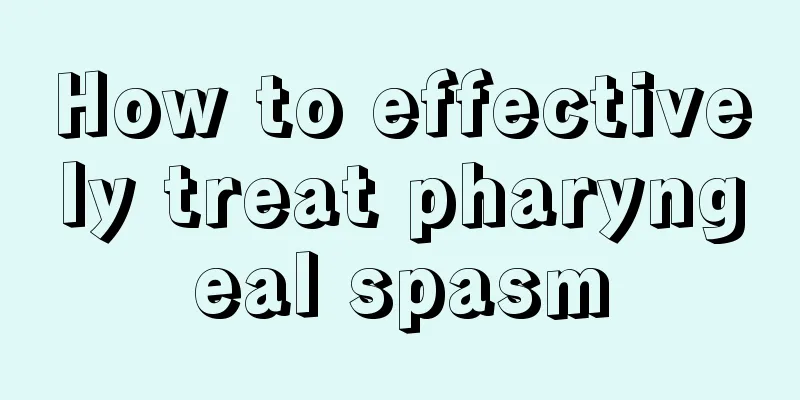How to effectively treat pharyngeal spasm

|
How to treat pharyngeal spasm? First of all, we should pay attention to understanding the cause. For example, common blood secretions in the airway or vomiting and regurgitation of gastric contents can easily cause irritation and cause the disease. The common treatment method now is surgery or lidocaine and other drug treatments. 1. Causes of pharyngeal spasm 1. Irritation to the throat caused by intra-tracheal operations, suctioning of sputum under light anesthesia, placement of oropharyngeal or nasopharyngeal airways, endotracheal intubation or extubation. 2. It is caused by stimulation from blood, secretions in the airway, vomiting, reflux of gastric contents, etc. 3. Caused by central brainstem lesions, such as brainstem vascular embolism, tumors, pontocerebellar diseases, syringobulbar disease, diffuse cerebral arteriosclerosis, etc. Differential diagnosis of pharyngolaryngitis Sore throat: It is the main symptom of oropharyngeal and laryngopharyngeal lesions, characterized by redness, swelling and pain in the throat and discomfort when swallowing, also known as "laryngeal congestion". Sore throat is seen in Western medicine such as acute tonsillitis, acute pharyngitis and simple laryngitis, peritonsillar abscess, etc. It is also a symbol of dry mouth, cold and illness. The throat muscles twitch, which may manifest as mild inspiratory stridor in mild cases and complete upper airway obstruction in severe cases. Inspiratory dyspnea and laryngeal stridor often occur suddenly at night, with panic, cold sweats, cyanosis, and suffocation, but the symptoms usually disappear immediately after a deep breath. The attack lasts for a short time, only a few seconds to 1 to 2 minutes, and can recur and occur continuously. There were no symptoms such as hoarseness or fever during or after the attack. Laryngoscopy usually shows no abnormalities. Treatment and prevention of laryngopharyngeal spasm 1. Tracheal intubation and surgical procedures should be avoided under light anesthesia, and hypoxia and carbon dioxide accumulation should be avoided. 2. It is best to extubate when the patient is fully awake. 3. Lidocaine can be used to prevent laryngospasm after extubation after tonsillectomy. Intravenous injection of 1-2 mg/kg 1-2 minutes before extubation can significantly reduce the incidence of cough and laryngeal spasm in children. However, swallowing action must be ensured at this time. |
<<: Is it better to eat sea cucumber or ganoderma lucidum for diabetes
>>: How long is the shelf life of banana chips
Recommend
8 health benefits of breathing through one nostril
Introduction: People usually use the phrase "...
What is the cause of nocturnal twitching
The symptoms of convulsions are quite common in l...
What to eat to gain weight
Some people say that they will gain weight even i...
What is the best way to treat cerebral infarction
Cerebral infarction is a common brain disease. Th...
What causes sensitive and tingling skin?
Sensitive and tingling skin is usually caused by ...
Small yellow spots and red bloodshot on the face
Many people may have encountered the phenomenon o...
Tips for removing head lice
Nowadays, with the improvement of people's sa...
What is a healthy diet during nasopharyngeal carcinoma treatment?
In recent years, nasopharyngeal carcinoma has bec...
Effective dietary treatment for teratoma
Pay more attention to diet after ovarian teratoma...
How to treat prostate cancer? Five methods of treating prostate cancer revealed
Cancer has been a headache in recent years, and t...
What is the most important way to prevent pancreatic cancer
Among the many cancer diseases, pancreatic cancer...
What causes less and yellow urine? Beware of these four triggers!
Traditional Chinese medicine emphasizes observing...
How long does it take for the dot-shaped embryo to have a fetal heartbeat?
Dot-shaped embryo buds are a phenomenon that occu...
What to do if you have esophageal pain and burning sensation
A burning sensation and pain in the esophagus is ...
What are the symptoms of advanced cardia cancer before death?
After being diagnosed with cardia cancer, patient...









